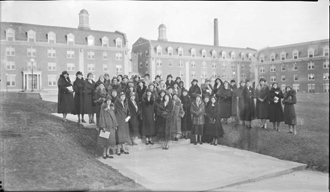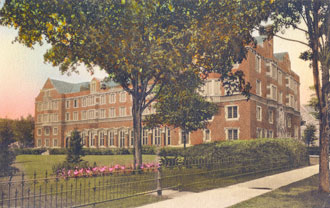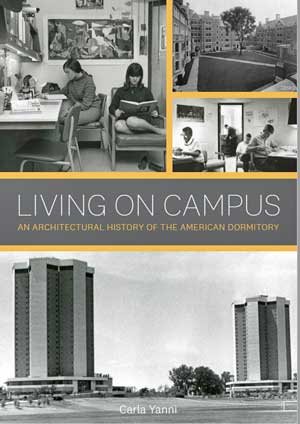
Did you live in a dormitory? Do you have fond memories of it, or were you plotting your escape from the moment you moved in? Many people live in residence halls during a transformational moment in their lives. And lots of people pay for their children to live in dormitories, too. But few stop to think about the way these everyday structures shape young lives.
Living on Campus is the first and only book that looks at the architectural history of this commonplace building type. I argue that college students dwelling together is not obvious or inevitable. Instead, it is an artifact of three centuries of American educational ideology that placed an outsized value on socialization. In the seventeenth and eighteenth centuries, students were boys who needed moral guidance; in the nineteenth century, women began attending college in large numbers, always under protective eyes; as the concept of the adolescent emerged around 1900, youthful men were encouraged to delay adulthood; in the Fifties, they were GIs eager to re-enter society; in the Sixties, students were members of a youth culture that administrators almost feared. This mad dash through the centuries is obviously oversimplified, and yet it nonetheless demonstrates that today’s students bear little resemblance to their forebears, which makes it all the more remarkable that the residence hall still thrives.
As an architectural historian, I use buildings to interpret the past. Through nuanced architectural analysis and detailed social history, I offer glimpses into the past, such as double-loaded corridors (which made surveillance easy but echoed with noise), staircase plans (which prevented roughhousing but offered little communal space), lavish lounges in women’s halls (intended to civilize male visitors), mixed-gender saunas for students in the radical 1960s, and lazy rivers for the twenty-first century’s stressed-out undergraduates. Color plates at the center of the book tell the history of college dormitories in a few pages, from the quadrangles for men and box-shaped buildings for women to skyscrapers and, eventually, hill towns. I also found one residence hall modeled on a beehive and one fraternity in the shape of a phallus.
I worked in the central administration at Rutgers for three and a half years, and I frequently heard other administrators ridicule the three slab-shaped high-rise dormitories from the 1950s that line the Raritan River. The tone was: “What were they thinking? Why did anyone ever think that was a good idea?” As an administrator and an historian, I knew that I could answer that question; I could place earlier academic and architectural decisions in a social historical context.

The black-and-white photograph shows a group of professional women posing in front of a brand-new dormitory. The year is 1928. It is a cold day. The women are bundled in fashionable cloth coats with fur collars. An African American woman, fourth from the left, is especially proud, as she deserves to be. A leader among educators in the US, Lucy Diggs Slowe, Dean of Women at Howard University, has completed the successful construction of a state-of-the-art quadrangle for women at one of America’s premier black colleges. The photo was taken at their annual conference where almost all the attendees were white. This remarkable image communicates one main theme of the book: that the dormitory was inextricably linked to the professional role of student deans and student deans were responsible for creating morally-centered citizens. The particular residence hall was the site for making friends and character-building, but it was much more. In the case of Howard, there was acute pressure on the young women who lived in this building, because, as Slowe explained to them, they represented not only Howard, but also their race and gender, to judgmental neighbors.
The end of chapter 2 takes the reader to the University of Michigan in the 1910s and 1920s, where one patron, William W. Cook, hired the same architects to design two residence halls, one for women and one for men. The plans differed: the women’s dormitory was based on the doubled-loaded corridor plan and the men’s dorm was a quadrangle with many entrances leading to staircases, with rooms off the stairs. The porosity of the men’s dormitory was not suitable for women. I was not the first person to notice this gender difference in planning college dwellings, but the case at the University of Michigan is a kind of natural experiment, since so many of the variables remain the same, but the plans for men emphasize freedom of movement while the plans for women rely on surveillance. The dormitories at the University of Michigan are carefully crafted buildings that garnered much attention when they were new.

Why continue to build residence halls in the age of distance learning? Do colleges need these buildings? Perhaps not. For centuries, students at community colleges and the universities of Europe managed to attain education without living on campus. On the other hand, the long history of dormitories suggests that fellowship and esprit de corps are enhanced by communal living. As more classes are taught online, demand for residence halls might decrease and living at home will be an inexpensive option. But the attraction of living on campus will endure. Some empty-nesters are relieved to have teenaged children out of the house. Students are motivated to move out of their family homes, because that transition traditionally draws a sharp line between high school and college, between adolescence and adulthood. Residence halls solidify, even magnify, social differences. The gap between the rich and the poor is widening in American society at large, and this fact makes the in-person networking opportunities afforded to those who live on campus more valuable than ever. Living in a residence hall gives students a boost up the social ladder and has done so since the earliest days of the colonial colleges. Living on campus will remain essential for face-to-face networking, for both friendship and future careers, and that social connection will continue to serve as a major incentive for students to attend college in the first place. The architecture of dormitories, therefore, is an ever-changing manifestation of the social meaning of higher education.


Carla Yanni is a professor of architectural history in the Art History Department at Rutgers University, New Brunswick, New Jersey. She is the author of Living on Campus: An Architectural History of the American Dormitory (University of Minnesota Press, 2019). Her second book, The Architecture of Madness: Insane Asylums in the United States, was as a 2007 “Book of Critical Interest” by the journal Critical Inquiry. Johns Hopkins University Press published her first book, Nature’s Museums: Victorian Science and the Architecture of Display. She holds a doctorate in Art History from the University of Pennsylvania.